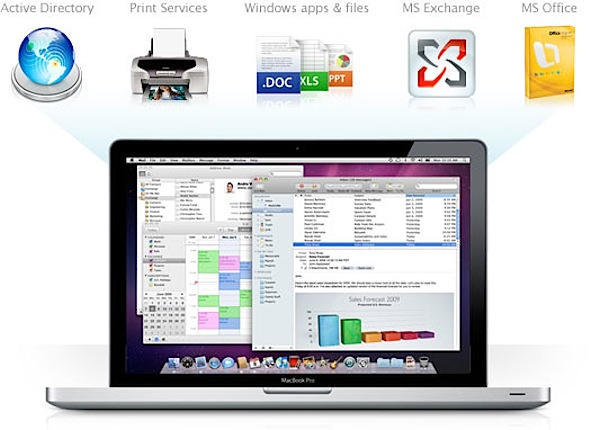Outside of the iPhone brouhaha, much of the buzz at WWDC today has been about whether the system-level support for Microsoft Exchange e-mail and calendaring in OS X Snow Leopard and various encryption options for Mac and iPhone would finally allow Apple to make serious in-roads in corporate America. Well, at least if corporate IT guys will give them a chance, that is.
In spite of Lonnie’s optimism, I think Apple is just as far today from mainstream adoption in big business as it was yesterday and pretty much every day of its entire history. As I’ve written before, the Steves founded Apple in large part because they thought that the IBMs and HPs of the world were holding back the potential of computers to transform our society.
Consequently, the organization’s entire self-image and frame of reference over time has been that big business is all too willing to adopt mediocre technologies based solely on a reputation for reliability. Macs have long provided superior tools for creative endeavors like graphic design and video editing, which is why Macs have a huge niche in corporate marketing departments, but the same can’t be said for other business pursuits.
Apple has a huge opportunity right now to make serious in-roads in the enterprise market while corporations resist upgrading to Windows Vista and don’t yet know whether or not they can trust Windows 7. But Apple won’t make big gains unless they take more drastic measures, three of which I outline below. Bear in mind, I’m not saying this is what Apple should do, just that this is what it would take to succeed in business.
Start making cheap computers with standardized parts.From the early 1990s until the sale to Lenovo, IBM’s ThinkPad line of notebooks defined the look, feel and attitude of computers for business. They were black, rugged, and nearly identical in industrial design. A machine from 1999 looked pretty much the same as one from 2003. Corporate IT managers loved ThinkPads because people generally couldn’t tell if their co-workers had a newer or better machine than theirs — the exterior was always a constant. All that, and frequently replaced parts like batteries and power supplies were common across the decade. If it worked on one, it worked on another.
Recent years have seen the trend that IBM began extrapolated upon in the corporate market. These days, it’s not just that corporations prefer to buy identical machines for employees at all levels — they’ve also chopped their budgets for PCs dramatically while increasing spending on servers and data centers. And that means that low-cost strategy players like Dell and HP are winning with large-screen machines for less than $500 (or significantly less at large volumes). If Apple wants to even think about competing, it would need to get cheap quickly and make compromises that the company has diligently avoided over the years. And do you really think business wants a line-up of laptops without replaceable batteries? Not in this galaxy.
Partner with a company with real enterprise credibility.
One of the qualities that makes Apple an amazing company is its single-minded pursuit of excellence. The company has long-since come to realize that outsourcing any of its marketing or design to another organization inevitably fails to live up to the brand’s standards (even in necessary marriages like AT&T…). Usually, Apple’s unique to the PC market combination of hardware and software is a strict competitive advantage. But that’s just not the case with corporate IT, where playing well with others matters more than playing well.
Transforming Apple on this front would require the company to partner up closely with IBM, HP, or Oracle to tailor the software on their servers and data centers to play better with Macs. As appealing of a concept as a massive data center made entirely of xServes might be, it’s just not a realistic option for most companies. And standard administration tools for big iron today is just not made to work effectively with Macs. Unless Apple’s ready to get cozy with an organization it has made abundantly clear it doesn’t much respect, this will be a major stumbling block.
Provide complete transparency about upcoming product releases.
OK, the other two points are tough, but this flat-out won’t ever happen. In the enterprise market, it’s absolutely essential that PC-makers show tech analysts and major corporate customers upcoming hardware and software before it ships so that companies can appropriately budget for significant purchases. If there’s a new line of business laptops shipping in June, IT needs to know about in last November.
Apple, meanwhile, thrives on secrecy, surprise, and delight. Can you imagine how underwhelming it would be to know about the latest iPhone nine months before its release date? Or how small an impact unibody MacBooks would have made if your IT department had gotten a call from the local Apple rep before Steve could take the wraps off of it? This is a compromise too far. Never happening.
***
So there you have it: three major hurdles to the enterprise market for Apple that it will almost certainly never overcome. Being a player as a business supplier means major compromise — and Apple hates compromising. And that’s great — that’s why I love them, and probably why you do, too. I mean, would you really want to use a Mac optimized for running Microsoft Office? Perish the thought.


